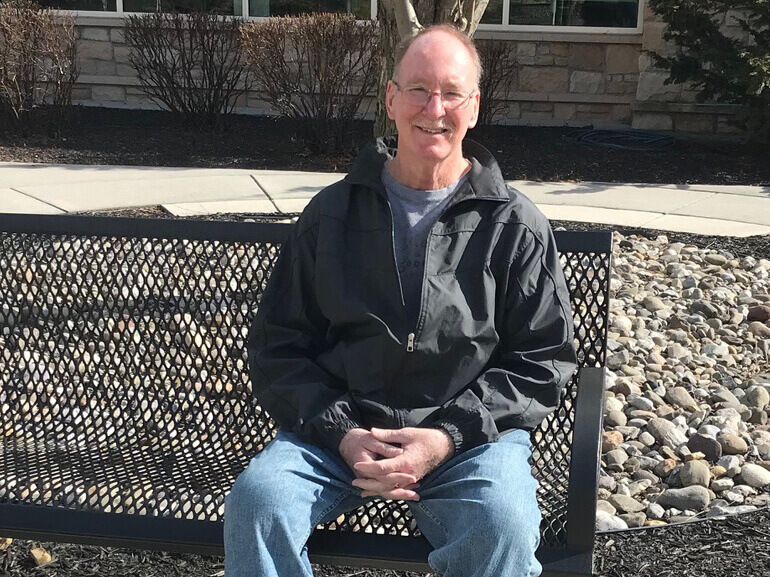Richard's Story*

63-year-old Richard Bisking was enjoying retirement from his career as a physical education teacher. Active and independent, he enjoyed working out at the gym and maintaining his yard.
Then, a relaxing night out turned into Richard’s worst nightmare. On his way home from a get-together, he was involved in a car accident. The other car hit him on the driver’s side. Richard sustained a traumatic brain injury and lost consciousness for about seven minutes at the scene. An ambulance transported him to the hospital.
Upon arrival, Richard was assessed and treated for a number of issues, including right-side weakness, difficulty swallowing and breathing on his own, a chest injury and multiple rib fractures.
On New Year’s Day 2019, Richard was transferred from the hospital to Select Specialty Hospital – Harrisburg for further supportive care.
Richard arrived unconscious, unable to breathe or eat on his own. Richard’s wife Kathie and the rest of their family hoped for recovery.
A physician-led team of therapists, nurses, dietitians, pharmacists and aides created a plan to restore Richard’s most critical abilities.
Respiratory therapists began testing whether he was ready to begin weaning from the machine supplying most of his oxygen. Over time, Richard was able do more of the work himself. As his lungs grew stronger, the increased oxygen, combined with the regimen of mobility exercises that increased blood flow, helped Richard wake up. More alert, he began actively participating in respiratory therapy. When he could breathe freely, on room air, his airway support was removed.
Speech language pathologists worked to retrain Richard’s mouth and throat to chew and swallow safely. Slowly, food and drink by mouth were reintroduced. Pharmacists monitored his medications, optimizing his dosing to ensure it met his recovery needs.
Physical and occupational therapists helped him through the next stage of mobility, working on helping him make larger movements, such as standing up and taking a few short steps.
In just 19 days, Richard made remarkable progress. He was eating, walking with a walker and speaking. He was ready for the next step of his recovery journey, and transferred to Penn State Health Rehabilitation Hospital to rebuild his strength. His goal was to enhance his ability to walk.
Walking may appear simple, but it is a complex series of movements. Richard worked on all of them -- moving his legs in a natural walking pattern, weight shifting and standing tolerance. Over time, his confidence grew. Then, therapists helped him improve stability, balance, endurance and coordination. Occupational therapists worked with Richard on helping him refine his ability to perform self-care, including grooming, bathing and dressing. Richard said that his most hard earned achievement was getting up and walking. “My turning point was going to rehab, when I finally became more aware of what was going on. I couldn’t believe I was able to finally walk on my own again,” Richard said.
While thinking about his commitment to his rehabilitation program, Richard said, “Yes, I believed I could attain my goals. That is the person I am. When I was discharged from the rehabilitation hospital, I was walking on my own and next, I hope to get back to driving. I have been taking better care of myself.”
An important part of Richard’s recovery journey has been the support of his wife, Kathie.
“She has been the most helpful part of my recovery. Her day goes around my needs and she and my daughter have been there for me at every level of care,” Richard said.
Thankful for the care and support Richard received, Kathie serves on the Patient Safety Committee for Penn State Health Rehabilitation Hospital. She actively manages Richard’s numerous follow up appointments, coordinates his continued plan of care and chauffeurs Richard throughout the community. Someday soon, Richard hopes to achieve his goal and be the one to drive Kathie to the rehabilitation hospital for her meetings.